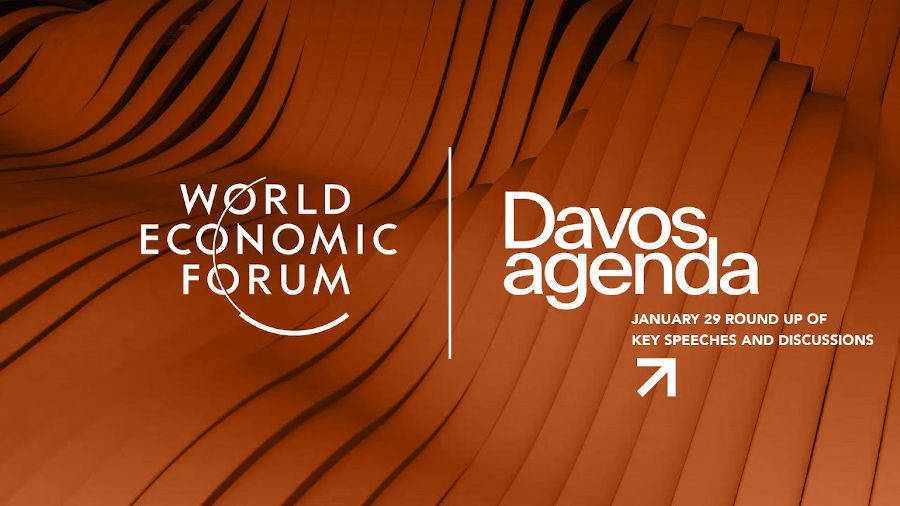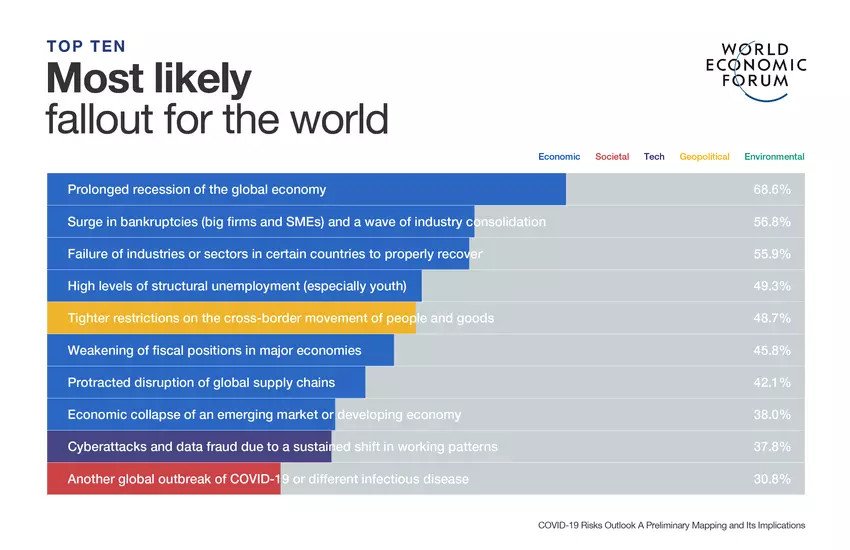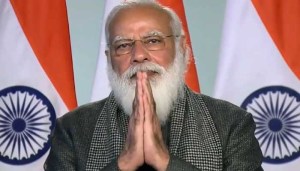World Economic Davos Forum 2021 : Agenda, Speeches, & Discussions: Daily Rolling Coverage – January 29 Highlights

January 29 Highlights
Updated daily
Compiled by Chris Devonshire-Ellis
- Special Addresses by Narendra Modi, Prime Minister of India; King Hussein of Jordan, and Alberto Fernandez, Argentine President
- Sessions on the 4th Industrial Revolution, Restoring Cross-Border Mobility, Reskilling and Upskilling Workforces in Asia, Shaping Empowered Data Societies, Accelerating Digital Inclusion In A Post Covid World, and Resetting The Business Of Data & A.I.
The World Economic Forum is taking place between January 25-29, and this year is being virtually. Over 2,000 Government, business and academic leaders are attending under the theme of “A Crucial Year to Rebuild Trust”, including 25 heads of state, and 600 global CEOs.
The World Economic Forum has released a chart of current global problems that the Davos meeting is expected to discuss. These can be seen here:

The theme for each day’s discussions has been planned and is as follows:
Monday January 25
“Designing cohesive, sustainable, resilient economic systems”
Tuesday January 26
“Driving responsible industry transformation and growth”
Wednesday January 27
“Enhancing stewardship of the global commons”
Thursday January 28
“Harnessing the technologies of the Fourth Industrial Revolution”
Friday January 29
“Advancing global and regional cooperation”
We will be bringing analysis and commentary of each day’s agenda during the week, with an Executive Summary next Monday, February 1st. To ensure you receive this, please obtain your complimentary subscription here
The World Economic Forum, or Davos (as it is usually held there) is an annual event often looked at for political signals between the larger nations. As such commentary involving China and the United States will be especially focused on with a new American President just in office amid the past two years of trade friction between the countries. However, apart from this major focal point, a great deal of effort will be spent on global, rather than bilateral challenges, and we shall be looking at the impact of these as opposed to purely the US-China rivalry. This feed will be updated daily.
Comments On Yesterday’s Davos Sessions, Thursday January 29
The main theme of yesterday’s events was Big Data, and A.I. together with sessions on re-skilling and upskilling workforces in Asia. Details of these events and contents are below.

The key address was by India Prime Minister Narendra Modi, in which he said that India was scaling up vaccine production and would soon be exporting globally, (in sharp contrast to what is currently happening in the EU and United States) stating that “These vaccines will help the countries of the world on a much larger scale, at a higher speed” and stressed that India had behaved as a globally responsible citizen during the pandemic “In these tough times, India has been undertaking its global responsibility from the beginning. When airspace was closed in many countries, India took more than 100,000 foreign citizens back to their countries & delivered essential medicines to more than 150 countries.”He also stressed the building of new infrastructure and the development of hi-tech solutions to global problems. His speech can be seen on video here.
Other addresses were by King Hussein of Jordan, representing the Arab community, in which he stated that the Arab World had made great strides in forming new alliances this past year and called for liberalizations for the Middle East. His speech can be read here.
Argentine President Alberto Fernandez, representing Latin America also spoke, stating there was ‘”No more room for irresponsible adjustments” and discussed IMF financing for Argentina, while also warning that the pandemic was not a question of “life or the economy, but life with a better economy”, cautioning against unsustainable debt having in the past been placed on emerging countries. In his current role as President of the Mercosur trade bloc, he stated that “As president pro tempore of Mercosur I find myself committed together with Brazil, Paraguay, Uruguay in an agenda with a deeper and more innovative integration with the rest of America, Europe, and Asia.” His speech can be read in English here and seen on video here
In terms of business and investment issues, the following subjects were the most applicable from yesterday’s sessions:
Harnessing The Fourth Industrial Revolution In Asia
Fourth Industrial Revolution technologies driven by artificial intelligence (AI) are expected to fundamentally change the world; in a recent global survey, 63% of CEOs said they believe that AI will have a larger impact than the internet. This Leadership Panel examines how industries and governments can work in partnership to unlock the potential of Fourth Industrial Revolution technologies for the benefit of all stakeholders in 2021.
Reskilling & Upskilling The Future Workforce In Asia
The World Economic Forum’s Future of Jobs Report 2020 states that 43% of the businesses surveyed are set to reduce their workforce, and 34% plan to expand their workforce due to technology integration. This Leadership Panel examines how businesses and governments can work together to retrain workers and redeploy them towards jobs of the future.
Restoring Cross-Border Mobility
COVID-19 has grounded aircraft and shut borders around the world, but with a vaccine in sight international travel is poised to return. What policies, practices and partnerships are needed to reopen borders and enable essential travel in a safe and sustainable way?
Shaping Empowered Data Societies
Data from personal, commercial and government sources has the potential to address various challenges related to the Sustainable Development Goals and COVID-19 challenges.
What policies, practices and partnerships are needed to empower individuals, communities and society to unlock the value of data?
Accelerating Digital Inclusion In A Post Covid World
With societies locked down during the COVID-19 pandemic, total internet usage has surged by as much as 70%. While the crisis has enabled hundreds of millions to participate online, it has exacerbated the digital divide for the remaining 47% of the population who remain offline. What policies, practices and partnerships are needed to drive digitization and connect the unconnected?
Resetting The Business Of Data & A.I.
The future of artificial intelligence (AI) will be shaped by the ways in which data is collected, stored, governed, accessed and used.
From a risk-based approach to data governance to ethically designed AI tools, what novel approaches are needed to harness the full value of data and accelerate the benefits of AI for society?
Sessions from Monday’s events included:
Keynote speech from Xi Jinping; Responding To The Covid-19 Crisis In Asia; Building Crisis-Resistant Healthcare Systems In A Post Covid World; Restoring Economic Growth; Building Net-Zero Cities; New Pathways To Economic Transformation; Developing The Evolution Of Stakeholder Capitalism, and Resetting Digital Currencies and can be accessed here.
Sessions from Tuesday’s events included:
Special Address by Ursula von der Leyen (President, EU Commission); Special Address by Cyril Ramaphosa (President of South Africa); Speeches by Angela Merkel and Emmanuel Macron; and sessions: Re-Assessing Corporate Risks And Re-Inforcing Resilience; Strengthening The Financial & Monetary System; Designing Connected & Sustainable Value Chains; Reimagining Manufacturing For Growth; Rethinking Cities For A Post Covid Future; Resetting Consumption For A Sustainable Future and Preparing For Deglobalization and can be accessed here
Sessions from Wednesday’s events included
Special Addresses by Vladimir Putin, Moon Jae-in & Benjamin Netanyahu.
Sessions on Environmental Protection, Climate Change, New Technologies, Blue Oceans, Eco-systems and new Food Technologies and can be accessed here
Related Reading
- Asia Cooperation Dialogue, 17th Foreign Ministers’ Meeting: “The New Normal and Safe and Healthy Tourism”
- China’s Foreign Minister At The Belt & Road Forum For International Cooperation: Analysis Of Wang Yi’s Statements, And The Impact On China FDI & ODI In 2021.
About Us
Silk Road Briefing is written by Dezan Shira & Associates. The firm has 28 offices throughout Asia, and assists foreign investors into the region. For strategic advisory and business intelligence issues please contact the firm at silkroad@dezshira.com or visit www.dezshira.com





